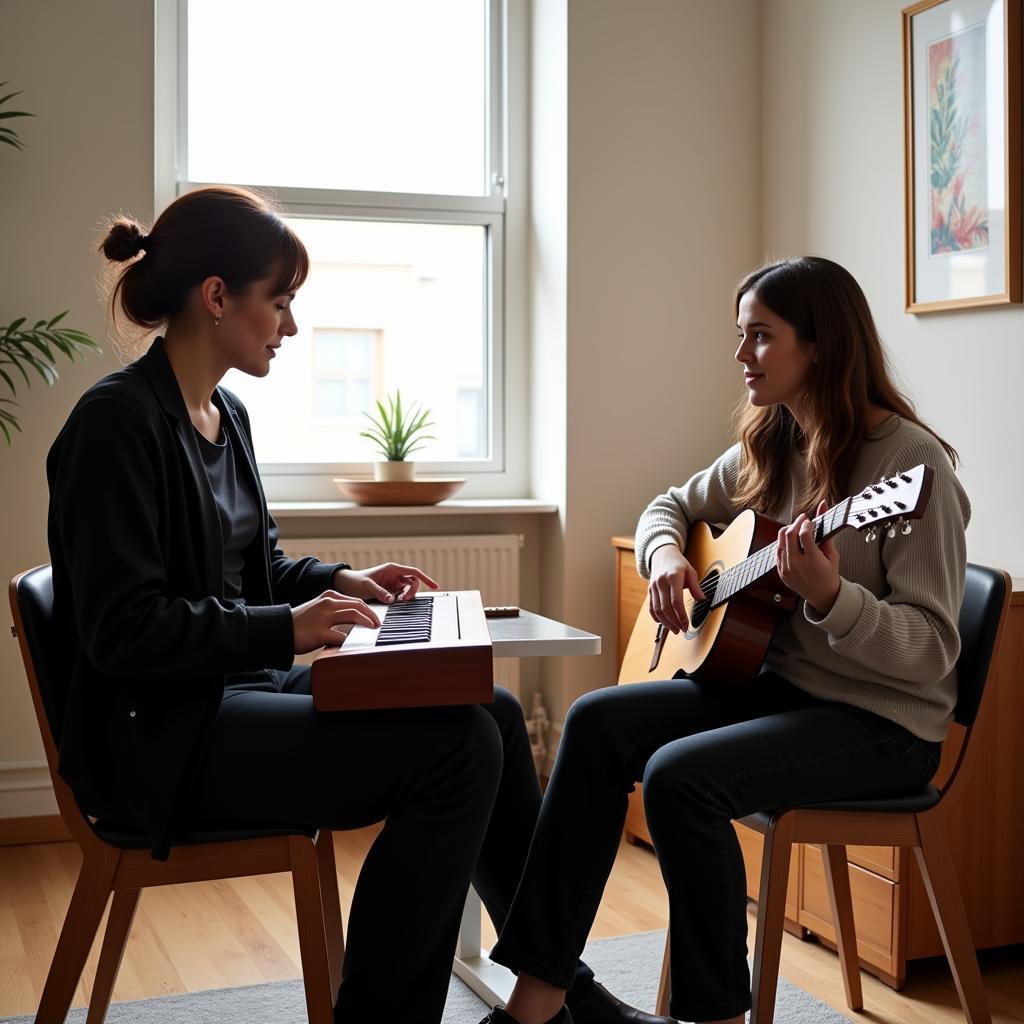Music therapy and mental health have become increasingly prevalent topics in IELTS Writing Task 2, appearing in various forms over the past few years. Based on analysis of recent exam patterns, questions about alternative therapies and mental wellbeing are likely to continue featuring prominently. Let’s examine some high-quality sample essays addressing impact of music therapy on patient recovery.
Task Analysis
Some people believe that music therapy can help treat mental health conditions, while others think traditional medical treatments are more effective. Discuss both views and give your opinion.
This question requires:
- Discussing two contrasting views on treatment approaches
- Evaluating effectiveness of music therapy vs traditional treatments
- Providing a clear personal stance supported by evidence

Band 8.5 Sample Essay
Music therapy has emerged as an alternative treatment for mental health disorders, though opinions differ regarding its efficacy compared to conventional medical interventions. While both approaches have merit, I believe a combination of music therapy and traditional treatments offers the most comprehensive solution.
Proponents of music therapy highlight its numerous psychological benefits and non-invasive nature. Research has demonstrated that musical engagement stimulates the release of dopamine and serotonin, naturally improving mood and reducing anxiety levels. Furthermore, music therapy sessions provide a creative outlet for emotional expression, helping patients process trauma and complex feelings without the potential side effects associated with medication. In countries like South Korea and Japan, music therapy programs have been successfully integrated into mental health facilities with promising outcomes.
However, advocates of traditional medical treatments emphasize their scientific validation and proven track record. Psychiatric medications and established therapeutic protocols have undergone rigorous clinical trials, demonstrating measurable effectiveness in treating conditions like depression, schizophrenia, and bipolar disorder. Additionally, conventional treatments often provide faster symptom relief and can be crucial in crisis situations where immediate intervention is necessary.
In my view, the most effective approach involves combining both methods. Music therapy can complement standard medical treatments by addressing emotional and social aspects of mental health while medication manages underlying biochemical imbalances. This integrated strategy allows patients to benefit from both the evidence-based efficacy of traditional treatments and the holistic healing potential of music therapy. For instance, a patient might take prescribed antidepressants while participating in weekly music therapy sessions to develop healthy coping mechanisms and emotional resilience.
In conclusion, while both treatment approaches have distinct advantages, a balanced combination can provide optimal outcomes for mental health recovery. Healthcare providers should consider incorporating music therapy alongside conventional treatments to offer patients the most comprehensive care possible.
Band 6.5 Sample Essay
Nowadays, there is a debate about using music therapy for treating mental health problems. Some people think it is helpful, but others believe traditional medical treatments are better. I will discuss both sides and share my thoughts.
Music therapy has some good points. It makes people feel happier because music is enjoyable. When patients listen to music or play instruments, they can forget their problems for some time. Also, it is cheaper than many medicines and has no bad side effects. For example, in India, some hospitals use traditional music to help stressed patients feel calm.
On the other hand, traditional medical treatments are more scientific. Doctors study for many years to understand mental health and know how to treat it properly. Medicine can quickly help people who have serious problems like depression or anxiety. Moreover, these treatments have been tested many times to make sure they work well.
I think both methods can be useful. Sometimes people need medicine to get better, but music therapy can help them feel more relaxed and positive. Using both together might be the best way. For instance, a patient could take medicine and also join music therapy groups to make friends and feel less lonely.
In conclusion, both music therapy and traditional treatments have their benefits. I believe using them together can help people recover better from mental health problems.
Key Vocabulary
- efficacy (n) /ˈefɪkəsi/ – the ability to produce a desired result
- therapeutic (adj) /ˌθerəˈpjuːtɪk/ – having a healing or beneficial effect
- holistic (adj) /həʊˈlɪstɪk/ – considering the whole person rather than just parts
- intervention (n) /ˌɪntəˈvenʃn/ – action taken to improve a situation
- complementary (adj) /ˌkɒmplɪˈmentri/ – combining in a way that enhances qualities
- resilience (n) /rɪˈzɪliəns/ – ability to recover from difficulties
- integrated (adj) /ˈɪntɪɡreɪtɪd/ – combining different elements into a whole
- protocol (n) /ˈprəʊtəkɒl/ – official procedure or system of rules
Conclusion
This topic reflects the growing interest in alternative therapies within mental healthcare. Similar questions might address:
- The role of art therapy in mental health treatment
- Traditional vs modern approaches to mental wellness
- The importance of creative therapies in healthcare
Practice writing your own response to this question and share it in the comments for feedback and discussion.